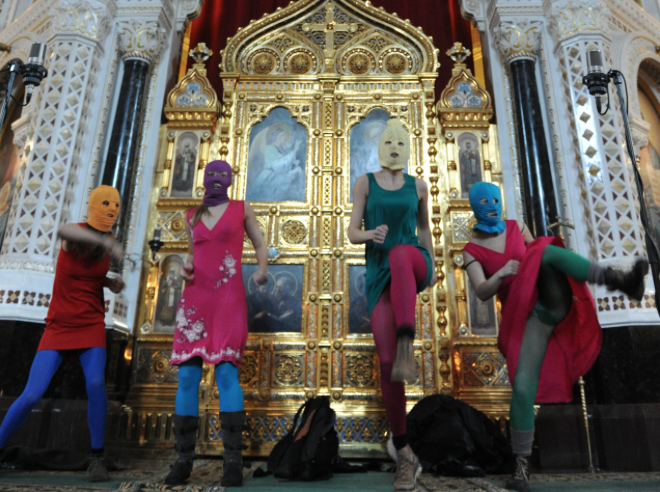February 21: Pussy Riot Arrested for Protest Art in Church (2012)
Her sentence suspended, Samutsevich was freed on probation, but Tolokonnikova and Alyokhina both were sentenced to two years in prison. Amnesty International and other groups declared the two jailed members of Pussy Riot “prisoners of conscience”; the topless feminist activist group Femen staged a protest in support of Pussy Riot on the same day, 17 August – cutting down a cross in Kiev – but Pussy Riot declined the support. Although both groups are feminist, Femen is atheist and Pussy Riot is not.
They protest in the Ukrainian language, Pussy Riot writes their name with Latin characters (as “Pussy Riot”) rather than in Cyrillic lettering (“Пусси Райот”), although occasionally you will see the name written in Cyrillic. The Moscow-based group was founded in August 2011 and has about 11 female members, plus production staff. They stage guerilla-style performances at unexpected locations, then edit the performance into a music video and release it on the Internet. Speaking for the group in the week before her sentencing, Nadya Tolokonnikova said, “Pussy Riot’s performances can either be called dissident art or political action that engages art forms. Either way, our performances are a kind of civic activity amidst the repressions of a corporate political system that directs its power against basic human rights and civil and political liberties.”Pussy Riot as a collective supports LGBT rights, education and health care, while opposing discrimination against women and restrictions on legal abortions. And while they are not atheists, they are church-state separationists: Pussy Riot decries the increasingly close ties between Russian President Putin and the Russian Orthodox Church. Indeed, the Russian Patriarch, calling Putin a “miracle from God,” supported Putin’s 2012 re-election, claiming the 16-year KGB veteran had “rectified the crooked path of history” by supporting the church. Pussy Riot rejoined, after the church protest, by saying the church is being used as a “weapon in a dirty election campaign” and Putin is “a man who is as far as can be from God’s truth.”
As Masha Lipman pointed out in the New Yorker* (2012), Pussy Riot’s putatively secular indictment (under Article 213.2 of the Russian Criminal Code) employed religious language, citing “sacrilegious humiliation of the age-old principles aimed at inflicting even deeper wounds to Orthodox Christians”; “deep offense and humiliation of the religious guides of the believers”; “chaotically waving arms and legs, dancing and hopping… all with a goal to cause a negative, even more insulting resonance in the feelings and souls of the believers”; “desecrating the cathedral, and offending the feelings of believers.”
Nadya, a student of philosophy, said at her trial: “I think that Christianity, as I understood it while studying the Old and especially the New Testament, supports the search for truth and a constant overcoming of oneself, the overcoming of what you were earlier […] [I]t seems to me that the prosecution is trampling on religion” [emphasis added]. So, far from displaying religious hatred, Pussy Riot is, like Tolstoy, opposing the Russian Orthodox Church but championing a personal, non-institutionalized Christianity.
While courageous, Pussy Riot’s position is also muddled: it is simply not possible to be a Christian and a feminist at the same time—unless you ignore large portions of Christianity. One is a system that is patriarchal to its core; the other is a philosophy which at its core is unalterably opposed to patriarchy. One might as well be a biologist and a creationist at the same time. As for offending the feelings of believers: Taking offense is a choice. And religious people take note: if your system can be destroyed by the truth, it deserves to be destroyed by the truth.** Furthermore, nobody has the right not to be offended. As comedian Stephen Fry noted (The Guardian, 5 June 2005), taking offense is no more than a childish whine.
* “Putin’s Religious War Against Pussy Riot,” The New Yorker, 24 July 2012. Accessed online. ** Often attributed to Carl Sagan (“That which can be destroyed by the truth deserves to be destroyed by the truth”), this is a paraphrase of a quote from P.C. “Pat” Hodgell (“That which can be destroyed by the truth should be”), in Section VIII, Part 1, of her fantasy novel Seeker’s Mask (1994). It is “spoken by a scholar [being dogmatic] in the grip of the academic version of a berserker fit,” according to the author.
NB: Tolokonnikova and Alyokhina were released from prison on 23 December 2013, perhaps only coincidentally in advance of the Sochi Winter Olympics: they were scheduled for release early in 2014, anyway. On 18 February 2014, a statement was made anonymously on behalf of some members of the group that both Alyokhina and Tolokonnikova were no longer members of Pussy Riot. According to news reports, Nadya and Masha and at least half a dozen others were arrested in the center of the Sochi over accusations of theft from a local hotel. The women had already been in the Winter Games host city to record a new performance opposing Putin. According to the L.A. Times, and video released on the Internet, the next day (February 19), Nadya and Masha and other members of Pussy Riot were whipped by Cossacks hired to patrol Sochi during the Winter Olympic Games as they tried to perform a song in front of a sign advertising the Games. The women were roughed up but not arrested.


